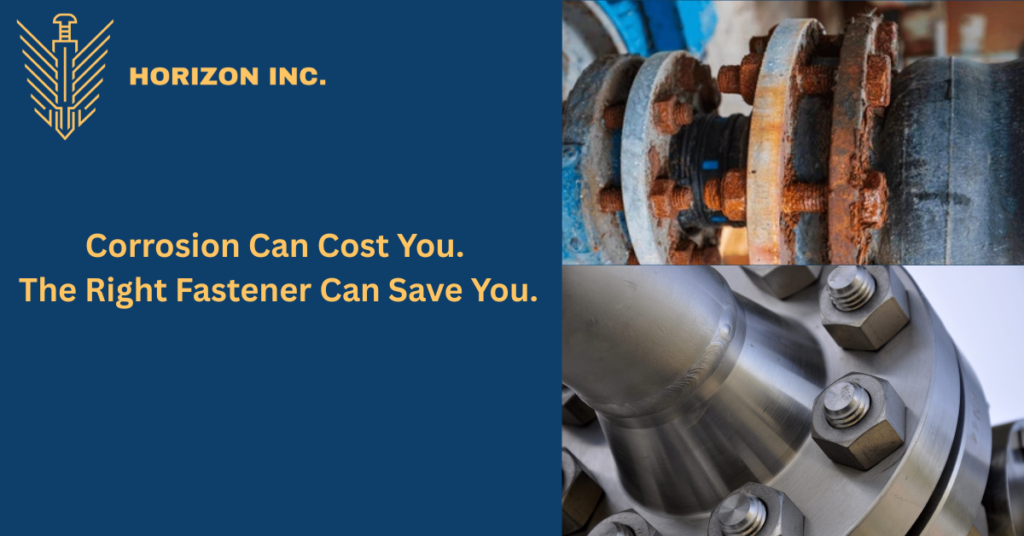Corroded fasteners can weaken structures and assemblies. Horizon Inc explains what causes fastener corrosion and how to prevent it with the right materials and coatings.
Common Causes of Fastener Corrosion and How to Prevent It
Fastener corrosion is one of the most frequent causes of premature joint failure in structures, equipment, and enclosures. From roofing screws on PEB buildings to bolts in solar structures and control panels in outdoor installations — if fasteners corrode, they lose strength, aesthetics, and sealing ability, eventually risking the entire assembly.
At Horizon Inc, we prioritize corrosion-resistant fastening solutions for our customers in infrastructure, fabrication, renewable energy, and electrical industries. In this post, we’ll explain what causes fastener corrosion and how to effectively prevent it.
📌 What Causes Fastener Corrosion?
1️⃣ Moisture and Humidity Exposure
Fasteners in outdoor structures, rooftops, or humid environments are continuously exposed to water, leading to oxidation and rusting.
2️⃣ Galvanic Corrosion
When dissimilar metals (e.g., a stainless steel fastener on a galvanized steel sheet) come in contact in the presence of an electrolyte (like water), one metal corrodes faster than the other.
3️⃣ Chemical Fumes and Industrial Atmospheres
Factories, chemical plants, and coastal sites expose fasteners to acidic, saline, or chemical-laden air, accelerating corrosion.
4️⃣ Inadequate Coating or Plating
Using uncoated fasteners or fasteners with low-quality plating in demanding environments leads to rapid surface degradation.
5️⃣ Improper Fastener Selection
Choosing a standard steel screw instead of a stainless steel or coated variant for outdoor or corrosive applications.
📌 How to Prevent Fastener Corrosion
✔ Choose the Right Material
- Stainless Steel 304/316 for excellent corrosion resistance
- Aluminium rivets for lightweight, non-rusting joints
- Zinc-plated steel for light indoor use
- Hot-dip galvanized fasteners for PEB and outdoor steel structures
✔ Use Protective Coatings
- Zinc plating, DACROMET, or Geomet coatings for enhanced corrosion resistance
- Epoxy-painted or powder-coated screws for additional surface protection
✔ Avoid Galvanic Corrosion
- Match fastener material to the structure’s metal
- Use insulating washers or nylon spacers between dissimilar metals
✔ Install Bonded EPDM Washers
In roofing and outdoor enclosures, these washers seal joints and prevent water entry, protecting both the fastener and joint.
✔ Maintain Regular Inspection and Replacement
Periodically inspect exposed fasteners, especially in marine or industrial environments, and replace corroded ones before they compromise joint integrity.
📌 Why Choose Horizon Inc for Corrosion-Resistant Fasteners
✔ Complete range of stainless steel, hot-dip galvanized, zinc-plated, and zinc flake coated fasteners
✔ Stock of self-drilling screws with bonded washers for PEB and solar structures
✔ Corrosion-resistant rivets, rivet nuts, washers, and self-clinching fasteners
✔ Batch test reports for salt spray and corrosion resistance available on request
✔ Technical advice on material selection based on application environment
📌 Final Word
Corrosion is a silent threat to any structure or assembly — and fasteners are often the first components to fail. With the right fastener material, coating, and installation practice, you can extend the life of your assemblies and reduce maintenance costs. At Horizon Inc, we supply fastening solutions built to resist corrosion, protect your projects, and perform reliably for years.
📌 Connect With Us
For corrosion-resistant fasteners and application-specific recommendations:
📞 Call: 080-41179152
📱 WhatsApp: +91 9916777262
✉️ Email: sales@horizonincindia.com
🌐 Visit: www.horizonincindia.com

